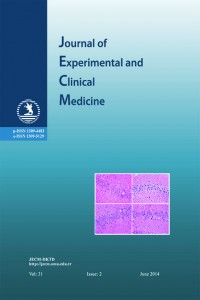Pre-transplantation and post-transplantation serum bone alkaline phosphatase levels in renal transplant patients
Abstract
Bone Alkaline Phosphatase (BAP) reflects the biosynthetic activity of the osteoblasts. End-stage renal disease and renal transplantation have effects on bone metabolism. The aim of this study was to evaluate serum BAP levels in pre-transplantation (pre-tx) and post-transplantation (post-tx) samples obtained from patients who underwent a renal transplantation. Forty end-stage renal disease patients (16 male and 24 female) undergoing transplantation and 40 healthy individuals (20 female and 20 male) volunteered for this study. The serum samples were obtained before the onset of immunosuppressive treatment and two months after renal transplantation. Serum BAP levels were measured by Ostease Kit (Beckman Coulter, California, USA) at DXI 800 immunoassay autoanalyzer. There were significant differences between control group and pre-tx group (p=0.015) and between control group and post-x group (P<0.001). The serum BAP levels were lower in the post-tx group than that of the control group the control group, but this difference was not statistically significant (p=0.023). These results suggest that osteoblast activity is suppressed during chronic renal failure and transplantation worsens osteoblastic inactivity, thus causing to enter a non-dynamic state the bone. BAP may be a useful parameter for assessing the metabolic status of bone before and after renal transplantation.
Keywords
Bone alkaline phosphatase End stage renal disease Renal osteopathology Renal transplantation
References
- Drechsler, C., Verduijn, M., 2011. Bone alkaline phosphatase and mortality in dialysis patients. Clin. J. Am. Soc. Nephrol. 6, 1752-1759. doi: 2215/CJN.10091110.
- Heaf, J.G., 2003. Bone disease after renal transplantation. Transplantation. 75, 315.
- Jose´, R., Weisinger, Rau´G, 2006. Bone disease after renal transplantation. Clin. J. Am. Soc. Nephrol. 26, 1300-1313.
- Kawarazaki, H., Shibagaki, Y., 2012. Kidney transplantation restored uncoupled bone turnover in end-stage renal disease. Clin. Nephrol. 78, 10Kobayashi, I., Shidara, K., 2012. Higher serum bone alkaline phosphatase as a predictor af mortality in male hemodialysis patients. Life Sci. 30, 212-2 doi: 10.1016/j.lfs.2011.11.006.
- Kusec, V., Smalcelj, R., 2004. Importance of biochemical indicators of bone turnover in patients on chronic dialysis and after kidney transplantation. Acta. Med. Croatica. 58, 51-57.
- Malluche, H., Claude, M., 2010. Bone disease after renal transplantation. Natur. Rev. Nephrol. 6, 32-40. doi: 10.1038/nrneph.2009.192. Małyszko, J., Wołczyn´ ski, S., 2003. Correlations of new markers of bone formation and resorption in kidney transplant recipients. Transplantation Proc. 35, 1351-1355.
- Mitterbauer, C., Oberbauer, R., 2008. Bone disease after kidney transplantation european society for organ transplantation. Transpl Int. 21, 6156 doi: 10.1111/j.1432-2277.2008.00665.x.
- Monier-Faugere, M.C., Mahwah, H., 2000. High prevalence of low bone and occurrence of osteomalacia after kidney transplantation. J. Am. Soc. Nephrol. 11, 1093-1099.
- Rix, M., Andreassen, H., 1999. Bone mineral density and biochemical markers of bone turnover in patients with predialysis chronic renal failure. Kidney International. 56, 1084-1093.
- Rojas, E., Raul, G., Carlini, R.G., 2003. The pathogenesis of osteodystrophy after renal transplantation as detected by early alterations in bone remodeling. Kidney International. 63, 1915-1923.
- Sardiwal, S., Gardham, C., 2012. Bone-specific alkaline phosphatase concentrations are less variable than those of parathyroid hormone in stable hemodialysis patients. Kidney International. 82, 100-105.
- Weiss, M.J., Ray, K., 1988. Structure of the human liver/bone/kidney alkaline posphatase gene. J. Biol. Chem. 263, 12002-120010.
Abstract
References
- Drechsler, C., Verduijn, M., 2011. Bone alkaline phosphatase and mortality in dialysis patients. Clin. J. Am. Soc. Nephrol. 6, 1752-1759. doi: 2215/CJN.10091110.
- Heaf, J.G., 2003. Bone disease after renal transplantation. Transplantation. 75, 315.
- Jose´, R., Weisinger, Rau´G, 2006. Bone disease after renal transplantation. Clin. J. Am. Soc. Nephrol. 26, 1300-1313.
- Kawarazaki, H., Shibagaki, Y., 2012. Kidney transplantation restored uncoupled bone turnover in end-stage renal disease. Clin. Nephrol. 78, 10Kobayashi, I., Shidara, K., 2012. Higher serum bone alkaline phosphatase as a predictor af mortality in male hemodialysis patients. Life Sci. 30, 212-2 doi: 10.1016/j.lfs.2011.11.006.
- Kusec, V., Smalcelj, R., 2004. Importance of biochemical indicators of bone turnover in patients on chronic dialysis and after kidney transplantation. Acta. Med. Croatica. 58, 51-57.
- Malluche, H., Claude, M., 2010. Bone disease after renal transplantation. Natur. Rev. Nephrol. 6, 32-40. doi: 10.1038/nrneph.2009.192. Małyszko, J., Wołczyn´ ski, S., 2003. Correlations of new markers of bone formation and resorption in kidney transplant recipients. Transplantation Proc. 35, 1351-1355.
- Mitterbauer, C., Oberbauer, R., 2008. Bone disease after kidney transplantation european society for organ transplantation. Transpl Int. 21, 6156 doi: 10.1111/j.1432-2277.2008.00665.x.
- Monier-Faugere, M.C., Mahwah, H., 2000. High prevalence of low bone and occurrence of osteomalacia after kidney transplantation. J. Am. Soc. Nephrol. 11, 1093-1099.
- Rix, M., Andreassen, H., 1999. Bone mineral density and biochemical markers of bone turnover in patients with predialysis chronic renal failure. Kidney International. 56, 1084-1093.
- Rojas, E., Raul, G., Carlini, R.G., 2003. The pathogenesis of osteodystrophy after renal transplantation as detected by early alterations in bone remodeling. Kidney International. 63, 1915-1923.
- Sardiwal, S., Gardham, C., 2012. Bone-specific alkaline phosphatase concentrations are less variable than those of parathyroid hormone in stable hemodialysis patients. Kidney International. 82, 100-105.
- Weiss, M.J., Ray, K., 1988. Structure of the human liver/bone/kidney alkaline posphatase gene. J. Biol. Chem. 263, 12002-120010.
Details
| Primary Language | English |
|---|---|
| Subjects | Health Care Administration |
| Journal Section | Basic Medical Sciences |
| Authors | |
| Publication Date | September 10, 2014 |
| Submission Date | May 3, 2014 |
| Published in Issue | Year 2014 Volume: 31 Issue: 2 |
Cite

This work is licensed under a Creative Commons Attribution-NonCommercial 4.0 International License.


